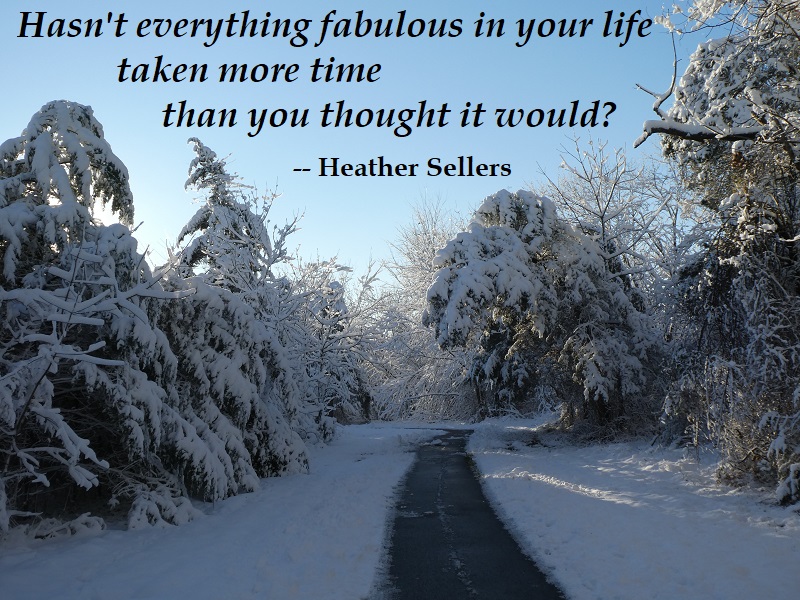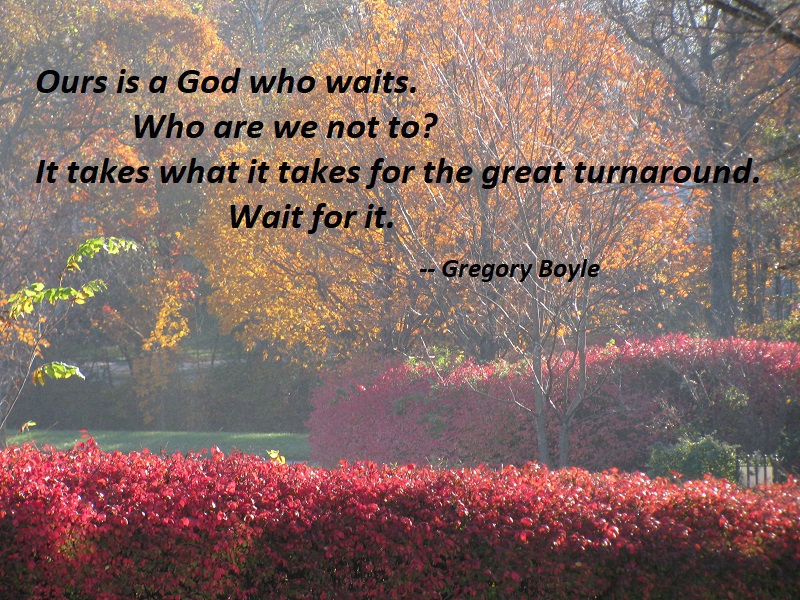Category: Waiting
Wait for It.
Teilhard de Chardin wrote that we must “trust in the slow work of God.”
Ours is a God who waits. Who are we not to? It takes what it takes for the great turnaround. Wait for it.
— Gregory Boyle, Tattoos on the Heart, p. 113
Photo: South Riding, Virginia, November 4, 2018
Just Past the Curse
When you can invest yourself deeply and unremittingly in the life that surrounds you instead of declaring yourself out of the game once and for all, because what’s happened to you is too bad, too deep, too ugly for anyone to expect you to move on from, that’s that good, rich place. That’s the place where the things that looked for all intents and purposes like curses start to stand up and shimmer and dance, and you realize with a gasp that they may have been blessings all along. Or maybe not. Maybe they were curses, in fact, but the force of your belief and your hope and your desperate love for life as it is actually unfolding, has brought a blessing from a curse, like water from a stone, like life from a tomb, like the actual story of God over and over.
I would never try to tell you that every bad thing is really a good thing, just waiting to be gazed at with pretty new eyes, just waiting to be shined up and — ta da! — discovered as fantastic. But what I know is that for me, and for my friend Jon, and for a lot of the people I love, we’re discovering that lots of times, not every time, maybe, but more often than not, there is something just past the heartbreak, just past the curse, just past the despair, and that thing is beautiful. You don’t want it to be beautiful, at first. You want to stay in the pain and the blackness because it feels familiar, and because you’re not done feeling victimized and smashed up. But one day you’ll wake up surprised and humbled, staring at something you thought for sure was a curse and has revealed itself to be a blessing — a beautiful, delicate blessing.
— Shauna Niequist, Cold Tangerines, p. 178-179
This Is It
But this is what I’m finding, in glimpses and flashes: this is it. This is it, in the best possible way. That thing I’m waiting for, that adventure, that movie-score-worthy experience unfolding gracefully. This is it. Normal, daily life ticking by on our streets and sidewalks, in our houses and apartments, in our beds and at our dinner tables, in our dreams and prayers and fights and secrets — this pedestrian life is the most precious thing any of us will ever experience.
I believe that this way of living, this focus on the present, the daily, the tangible, this intense concentration not on the news headlines but on the flowers growing in your own garden, the children growing in your own home, this way of living has the potential to open up the heavens, to yield a glittering handful of diamonds where a second ago there was coal. This way of living and noticing and building and crafting can crack through the movie sets and soundtracks that keep us waiting for our own life stories to begin, and set us free to observe the lives we have been creating all along without even realizing it.
I don’t want to wait anymore. I choose to believe that there is nothing more sacred or profound than this day. I choose to believe that there may be a thousand big moments embedded in this day, waiting to be discovered like tiny shards of gold. The big moments are the daily, tiny moments of courage and forgiveness and hope that we grab on to and extend to one another. That’s the daily, tiny moments of courage and forgiveness and hope that we grab on to and extend to one another. That’s the drama of life, swirling all around us, and generally I don’t even see it, because I’m too busy waiting to become whatever it is I think I am about to become. The big moments are in every hour, every conversation, every meal, every meeting.
— Shauna Niequist, Cold Tangerines, p. 16-17
Rich Complexity
If Jesus were a magic prayer machine, he’d have healed this woman’s daughter instantly, and we would not have discovered her feisty, creative spirit. Likewise, Jesus’ ambiguity with us creates the space not only for him to emerge but us as well. If the miracle comes too quickly, there is no room for discovery, for relationship. With both this woman and us, Jesus is engaged in a divine romance, wooing us to himself.
The waiting that is the essence of faith provides the context for relationship. Faith and relationship are interwoven in dance. Everyone talks about how prayer is relationship, but often what people mean is having warm fuzzies with God. Nothing wrong with warm fuzzies, but relationships are far richer and more complex.
— Paul E. Miller, A Praying Life, p. 190-191
Spirals and Layers
I’ve seen and experienced over and over that grief and loss are ALWAYS
Doorways to Transformation.
My experiences with both have showed me that we can more actively work with time as we process grief and loss, instead of just waiting for time to pass. We really can consciously practice integrating loss and grief and living with them more fully and beautifully.
I know now that this healing happens in spirals and layers and NOT in steps like a ladder.
We cycle back around and start over, get stuck in the middle, and sometimes get to what feels like the end quickly.
We can weave all these experiences together into an eventual elegant tapestry. I’ve been speaking with lots of people about the subjects of loss and grief, and it’s clear that in every case, whatever has been lost — job, savings, home, health, money, life — has tremendous gifts and opportunities to offer
IF
We do our transformational work.
— SARK, Glad No Matter What: Transforming Loss and Change Into Gift and Opportunity, p. 19-20
God’s Orchestration
“Thy will be done, God,” we pray, “but in the meanwhile, let me try this.” It is difficult to allow the timing of God, the moving of other gears into play. We forget that God is orchestrating a much larger whole, and we tend to think of and want God’s will for us to be an instantaneous release from all that troubles us. We want our spiritual life to be a product, not a process. We want to be finished, solved, soothed — and sometimes it is our discomfort that is drawing us toward God.
— Julia Cameron, Faith and Will, p. 60-61
Growth Can’t Be Hurried.
I have no confidence in forcing the moral or spiritual garden. A hothouse development must necessarily be a sickly one, rendering the plant unfit for the normal life of the open air. Wait. We must not hurry things.
— George MacDonald, Wisdom To Live By, p.120
God’s Agenda
It is one of the ironies of the spiritual life that so much can be seen in retrospect as having been designed in our own best interest. When something finally does come to pass, it is often all we can do to manage it. “Why, if this had happened any sooner, I wouldn’t have been ready,” we catch ourselves thinking. “I needed every instant of preparation for this that I have had.” Many times we ask God for help with securing a certain agenda, then rage because God does not cooperate, only to have God’s agenda revealed later as far better.
It is in seeking to cooperate with God’s agenda for our life that we come to some sense of peace. Is it too much to think that God has an agenda for each of us? I don’t think so. Again, a look at the natural world tells us of the exquisite particularity of God’s care. The daffodil is given just what it needs to grow and we are asked only to cooperate. We must be willing to be either the daffodil or the violet, according to God’s will for us. We so often do not see the lineaments of our own character being formed. We have an idea of ourselves that may be counter to what God’s idea for our self is. I am in the midst of discovering this for myself right now.
— Julia Cameron, Faith and Will, p. 23-24


